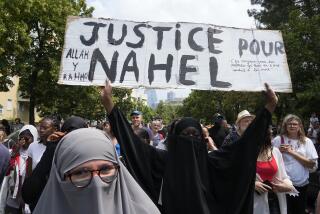AIDS / A STRATEGY FOR PARIS? : Reopening of Brothels Under Study in France
- Share via
PARIS — Because of an alarming rise in AIDS cases, French officials are considering reopening the government-sanctioned houses of prostitution that were a fixture of Parisian life until they were closed through the efforts of a crusading city councilwoman 44 years ago.
Paris’ director for health and social welfare, Michele Barzach, faced with statistics showing Paris as Europe’s leading city for AIDS cases--fourth in the world behind San Francisco, New York and Miami--has called for a crackdown on street prostitution and the reopening of brothels. They would be modeled on the government-monitored Eros Centers found in West Germany.
“Enough of this hypocrisy and collective irresponsibility,” Barzach, a former minister of health in the national government, said last week. “Remember, in this affair, the responsibility of the government is at stake.”
Barzach’s statement rekindled a debate that has surfaced periodically here since the government-sanctioned houses of prostitution-- les maisons closes --were shut down under a law promulgated in 1946 by Councilwoman Marthe Richard, a World War II heroine. The ordinance was followed by an act of Parliament, the so-called Richard Law, that resulted in the closure of brothels all over France.
Opposing Barzach is her own boss, Mayor Jacques Chirac, along with Minister of Health Claude Evin and several high-ranking police officials.
“In Germany the Eros Centers are like slaughterhouses, with terrible working conditions,” Police Commissioner Hubert Martinez told the newspaper Journal du Dimanche.
But there appear to be differences of opinion even among police officials. Martine Monteille, chief of the vice squad, said in a television interview that she favors “a return to at least some medical controls.”
In the German system, the Eros Center women are subject to medical examination every 14 days and are required to use condoms for their protection and the protection of their customers. Unlike street prostitutes, they have almost no choice of customers.
Lining up with Barzach, a maverick leader in the right-wing Gaullist party, was Bernard Kouchner, secretary of state for humanitarian action in the Socialist government.
“We have to face the situation squarely,” said Kouchner, physician-founder of the international brigade of volunteer medical doctors, Medicins sans Frontieres. “It is a problem of public health in which the facts have changed. When we look at the Paris numbers for AIDS, it’s terrifying.”
According to recent statistics, France has more than 9,000 active cases of AIDS, or acquired immune deficiency syndrome, including 4,400 in Paris and the surrounding Ile de France. An estimated 250,000 French men and women have tested positive for the human immunodeficiency virus that causes AIDS, health officials say.
French authorities have attempted to combat the epidemic with an unusually explicit advertising campaign encouraging the use of condoms. Because the majority of AIDS victims are intravenous drug users, the city is trading disposable needles for used needles.
The condom program has been much less successful than similar programs in other European countries. Fewer than 10% of the sexually active population between the ages of 18 and 49 say they use condoms regularly.
Officials have been especially concerned by a significant recent increase in sexually transmitted AIDS cases.
Last week, after a lengthy investigation, the police raided the Bois de Boulogne, a public park, and arrested 150 male prostitutes; 18 were charged as leaders of a transvestite ring.
Prostitution has thrived for decades in the park, located on the western edge of Paris, but for several years it has been dominated by male prostitutes dressed as women.
To arrest a person on a sex-related charge in France is difficult. The 1946 law that Marthe Richard pushed through the City Council closed such infamous Paris institutions as the the House of All Nations. But it did not outlaw prostitution; it only made it illegal to operate a house of prostitution or to solicit for prostitution. As a result, prostitution flourishes openly in several areas of the city, including the notorious Rue Saint Denis on the Right Bank.
More to Read
Sign up for Essential California
The most important California stories and recommendations in your inbox every morning.
You may occasionally receive promotional content from the Los Angeles Times.













